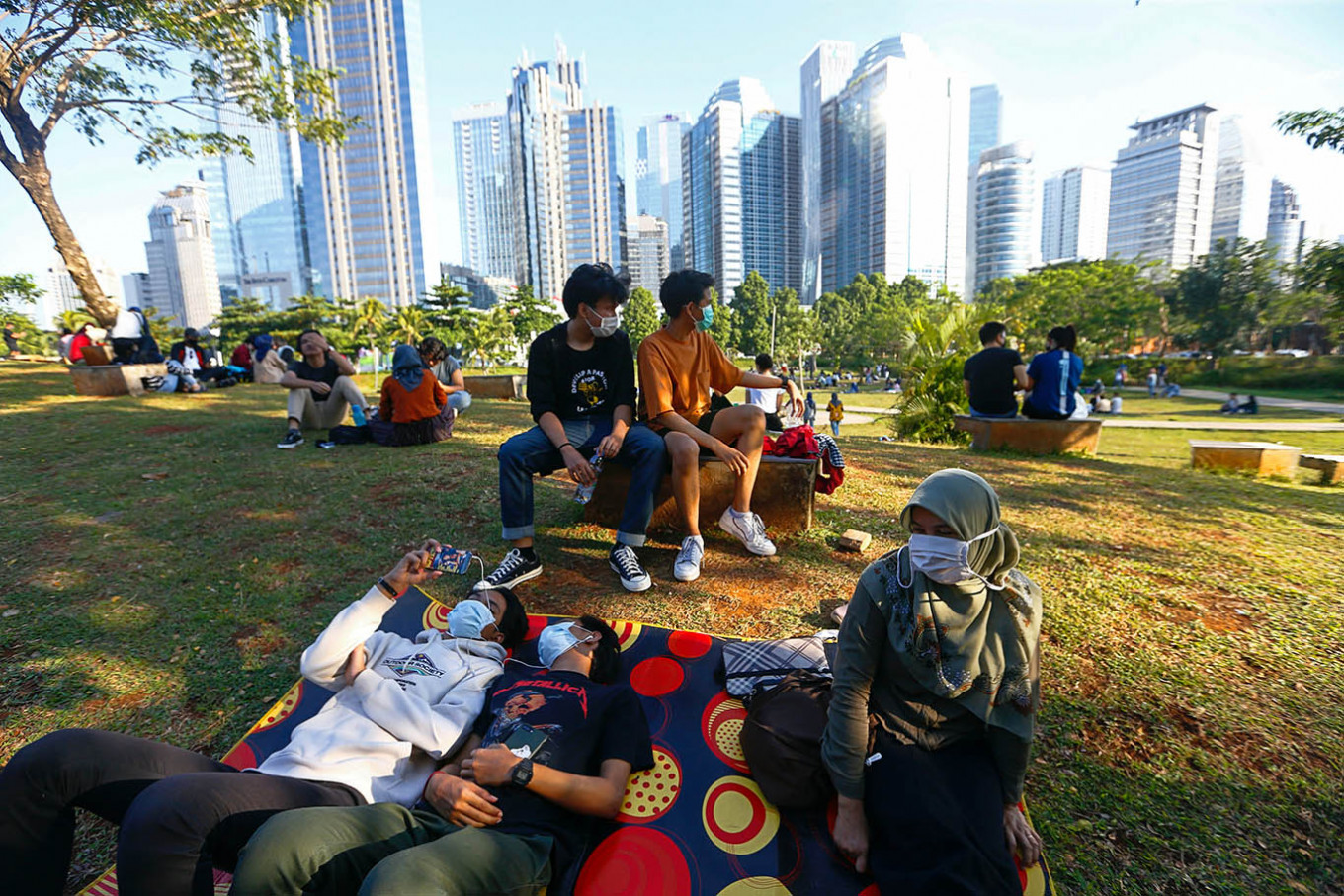Popular Reads
Top Results
Can't find what you're looking for?
View all search resultsPopular Reads
Top Results
Can't find what you're looking for?
View all search resultsCritics lambast govt over bullish tone in COVID-19 messages
Activists and public health experts have criticized the government for failing to balance between optimistic and cautionary messages in disseminating COVID-19 information, which they say could undermine public health measures to tackle the pandemic.
Change text size
Gift Premium Articles
to Anyone
Activists and public health experts have criticized the government for failing to balance between optimistic and cautionary messages in disseminating COVID-19 information, which they say could undermine public health measures to tackle the pandemic.
Indonesia has been struggling to communicate and carry out a consistent and effective response to the current pandemic, owing partly to the sheer complexity of a bureaucracy responsible for more than 260 million people.
As a result, an increasing number of state actors have opted for action that, more often than not, causes friction and confusion as to how best to respond to a multifaceted crisis in Southeast Asia’s largest economy.
Anita Wahid, a member of the committee for the Indonesian Anti-Slander Society (Mafindo), said she had noticed recently that the government had a tendency to convey an optimistic tone in its public communications, but without including a message calling for vigilance to prevent transmission.
Anita said she was concerned that, if this were to continue, the public would be split into those who comply with health protocol and those who underestimate the threat of the disease, further dividing society.
The anti-hoax activist noted that, for instance, there were cases where gravediggers were being harassed by bereaved members of a victim’s family for insisting on proper COVID-19 burial protocol. This, Anita said, illustrated a widening rift in society that could lead to even bigger conflict.
“It is true that we really need to be given hope that we can get through this problem, but what is actually important – and what the government has missed – is that there is a need to balance that hope with cautiousness,” she told The Jakarta Post on Monday.
President Joko “Jokowi” Widodo said on Saturday that Indonesia’s case number was still lower than those of India and the United States, but he failed to mention that the scale of testing in the country lags behind the two others.
According to the most recent data on ourworldindata.org, Indonesia has carried out 111 daily tests per 1 million people, whereas India and the US logged 784 and 2,201 daily tests per 1 million people, respectively.
Meanwhile, Coordinating Maritime Affairs and Investment Minister Luhut Pandjaitan recently instructed state-owned companies to speed up the local production of remdesivir, while the President promised in March to provide millions of doses of hydroxychloroquine to treat COVID-19 patients. Neither drug is a proven treatment for COVID-19, and they are still being tested.
But while providing prompt curative solutions is important, experts have underlined the greater urgency of taking preventive action to limit surging cases that may overwhelm healthcare capabilities.
Irma Hidayana, cofounder of the LaporCOVID-19 volunteer group, said the government’s statements attempted to illustrate that it had been doing well to limit virus transmission, when actually the opposite was true.
Indonesia has seen a continuously rising number of cases since March. The nation logged record daily highs, all above 4,400 new cases, for three consecutive days last week. As of Monday, the official number of infections nationwide stands at 278,722, with more than 10,000 deaths.
This has put a continuous strain on the country’s healthcare system, with hospitals being inundated by patients and practitioners overworked.
Coordinating Economic Minister Airlangga Hartarto on Sept. 10 appeared to play down Jakarta Governor Anies Baswedan’s suggestion that the capital needed to return to large-scale social restrictions (PSBB) amid an “alarming” shortage of hospital beds, saying the state had enough funds to increase capacity as needed.
Anies eventually reimposed PSBB on Sept.14, prompting further protests from the Presidential Palace.
LaporCOVID-19 has assisted dozens of people with COVID-19 who had difficulties finding hospital beds, not only in Jakarta, Irma said.
“If the situation is unclear, tell it like it is. But accompany it with instructive information, so as to raise people’s awareness,” she told the Post on Monday.
“Show us the data and information that proves things are not fine but that we can work through it with some requirements, including strong regulations and protections for the people.”
The mixed messages the government is articulating have adverse effects on the health sector.
Bambang Pujo Semedi, head intensive care unit (ICU) doctor at East Java's main COVID-19 referral hospital, Dr. Soetomo, said government officials should refrain from "lullabying" the public with their statements, which sometimes come off as neither correct nor appropriate.
Pujo, who also heads the Intensive Care Doctor Association (PERDICI), called on officials to amplify the message that COVID-19 still could be dangerous and that medical experts still don’t know much about its long-term effects.
He also wanted to draw attention to the fact that there are only around 330 intensivist doctors, 2,600 anesthetists and 8,000 intensivist nurses in the country, and that they were neither evenly distributed nor always treating COVID-19 patients.
"Honestly, we've been stressed out from having to deal with patients in really bad condition and the many who died. This is what the general public can't see, but we see it directly every day," Pujo said.










